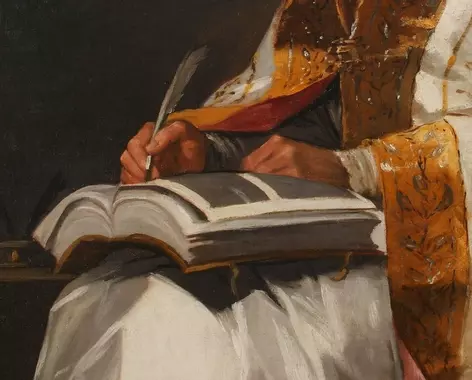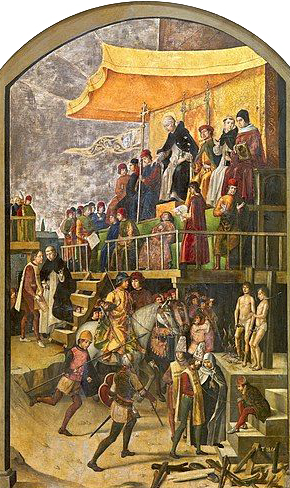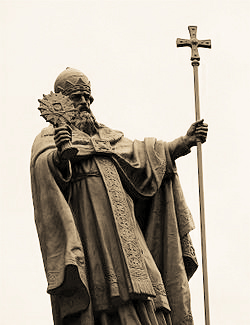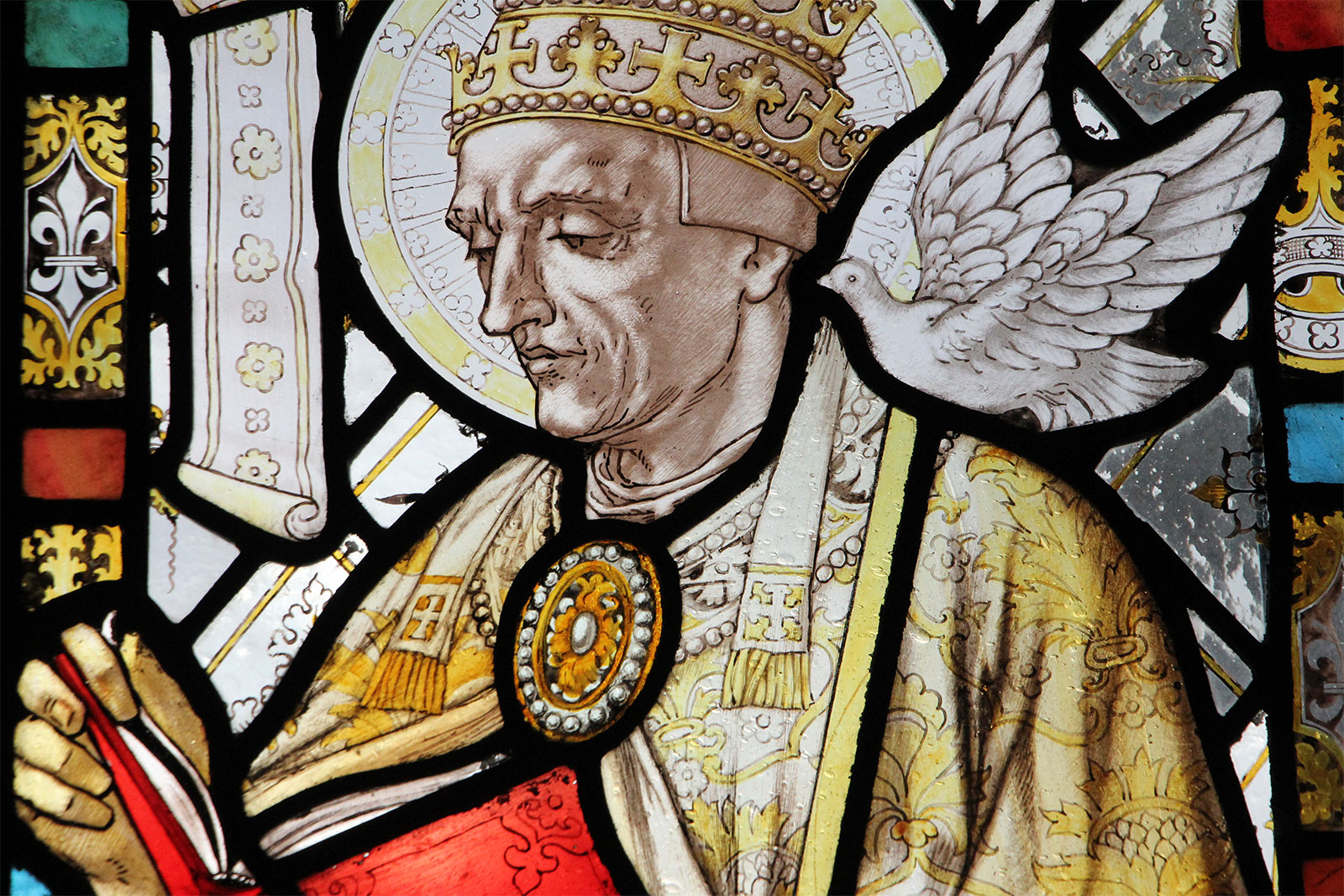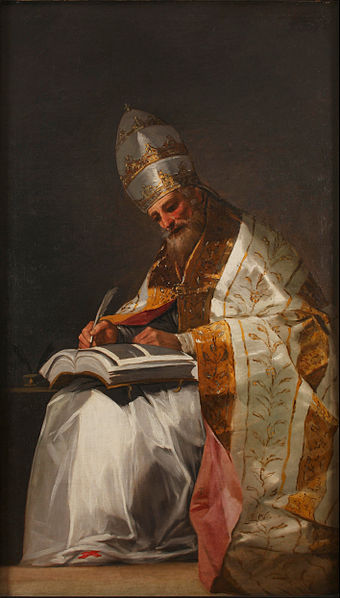Translated from the original
Foreword of Blut und Ehre:
 Born on January 12, 1893 in Reval, Alfred Rosenberg experienced as Baltic-German all the severe suffering of ethnic Germans and the Russian Revolution. To enlighten Germany about this and to help protect her against communism, at the end of 1918 Rosenberg went to Germany, was introduced to Adolf Hitler by Dietrich Eckart and joined him in 1919.
Born on January 12, 1893 in Reval, Alfred Rosenberg experienced as Baltic-German all the severe suffering of ethnic Germans and the Russian Revolution. To enlighten Germany about this and to help protect her against communism, at the end of 1918 Rosenberg went to Germany, was introduced to Adolf Hitler by Dietrich Eckart and joined him in 1919.
In 1921 he took over the Völkischer Beobachter [Folkish Observer]. Rosenberg marched with the Führer in Coburg in 1922 and the Feldherrnhalle in 1923. After November 9, 1923 he tried to hold together the movement’s remnants. When the Führer returned from Landsbergand he took over management of the Völkischer Beobachter and expanded it more and more in the following period until, after the victory, it became Germany’s largest newspaper.
When in 1930 the wish for an official NSDAP magazine became even stronger, Rosenberg created the Nationalsozialistische Monatshefte [The National Socialist Monthly]. In 1929 he founded the Kampfbund für deutsche Kultur [Fighting Federation for German Culture]. In 1930 Rosenberg became a member of the Reichstag and a representative of his faction for foreign affairs. Through trips and work, he became more and more immersed in questions of foreign affairs and presented the new foundations in this area. He was appointed in April 1933 chief of the Foreign Affairs Office of the NSDAP by Adolf Hitler and shortly thereafter Reichsleiter.
Alfred Rosenberg, in a certain sense, is the father of National Socialist literature. Already in 1919/20 he had published several writings about Bolshevism, Freemasonry and the Jewish Question and made the fight against international powers one of his main tasks. We find him as a domestic fighter in his little-noted book Thirty November Heads, which appeared in 1927. His 1930 fighting work The Swamp, one of the most valuable documents against the cultural decline of the post-war years, was on a similar level. Already in 1922 Rosenberg had published Nature: Principles and Goals of the NSDAP, the movement’s first publication! Later, he gave the movement two of its most basic writings: Future Path of German Foreign Policy and The Structure of National Socialism.
His main work, however, is The Myth of the Twentieth Century, which in 1923 experienced huge press popularity. Hanns Johst wrote: ‘I am often asked about the principles of National Socialism. Here is the work in which the manifestation of these principles is achieved…’ [Pages 7-8. The following is taken from pages 36-43 of the English translation.]
The ‘Centre’ and ‘Christian Folk Service’ parties
Nationalsozialistische Monatshefte [The National Socialist Monthly], April 1931:
The relationship between National Socialism and religion has been an issue since the appearance of the NSDAP. Adolf Hitler took the standpoint of a statesman from the beginning. He views the existence of various religious denominations as given and wants to keep the political movement out of the religious fighting. One should think that it would be agreeable to every Christian denomination to see the emergence of a worker movement that energetically combats soul-killing, atheistic Marxism and takes up an idealistic idea against our time’s rule by Mammon and, like Jesus, swings the whip against the money-changers and traders.
But the opposite has happened. Precisely the party that has claimed to practice Christian politics picked up a fight against National Socialism and put itself on the side of a Social Democracy hostile to any religion. That party formed coalitions with the purpose to annihilate the German workers’ movement and supported those powers that, for years, have financed the leave-the-church movement. After such a coalition this propaganda has not ceased.
Something was just as hated by Marxism as by the Centre: the conscious folk-feeling and the call to a Germanic morality-feeling, as can be read in our party program, paragraph 24. At Catholic Days, which represent Centre meetings (Contance 1923), German nationalism was presented as ‘the greatest heresy’ and bishop Mainz and cardinal Faulhaber competed in the condemnation of this ‘new heathenism’. As church princes, they banned membership in the NSDAP; yes, sometimes even excluded Catholic National Socialists from the sacraments.
In the process they referred to the Catholic doctrine. What is bizarre is that, in strictly Catholic Italy, the most extreme nationalism has become a state government and the Pope, who for decades has refused any reconciliation with liberalism, is now in peace with the leader of this growing nationalism. The Pope even called Mussolini a ‘man of Providence’ after the signing of the Lateran Pact. From Italy’s church organs we can now hear, even more frequently, the king’s hymn. And of the cardinals of Italian descent it is said that, under the purple, they wear the black-shirt of fascism.
The German folk now claims nothing more than it should be granted the same right to national pride; the right to erect a real national state based on its character. If, in face of the no longer contested Italian facts, this is contested based on the ‘Catholic doctrine’ by church princes there are two possibilities: either there are two Catholic doctrines, or the faith of the Catholic masses is being intentionally misled for the achievement of political goals.
______ 卐 ______
Editor’s Note: Since this article of The National Socialist Monthly was addressed to the Christian masses, Rosenberg fails to say the obvious. Remember Hitler’s words in Mein Kampf:
We have to distinguish between the state as a vessel and the race as the content. This vessel only makes sense if it is able to preserve and protect its contents; otherwise it is worthless.
This week, commenting on the above quotable quote, Krist Krusher said: ‘This is why all self-proclaimed National Socialists should never think of Hitlerism as being nothing more than “German Fascism”. As Fascism is built entirely from the State, it always thought of race as secondary. It is about as removed from us as Marxism in this regard’.
______ 卐 ______
Since we can dismiss the first possibility (the Roman church has only one leader), only the second remains. The Centre accepts Zionists and chairmen of Jewish cultural communities as Reichstag candidates. It even allows Protestants as members without influence, but is nonetheless a strictly Catholic denomination party. Just as Marxism wants to eternalise the nation’s split through the doctrine of social class struggle, has the Centre declared against the German nation the denominational class struggle and has carried the spiritual, religious struggle into the sphere of power politics. And just as the Social Democrat only has an eye on his class, so does the Centre leader only has his denomination’s interests.
This party lives from conflict. Hence the NSDAP was hated most deeply from the first day because religious tolerance inside the party was practically carried out in an exemplary manner. Religious differences of opinion and philosophical competitions had to be carried out outside the party organisation. As soon as it assembled, as soon as the SA put on its brown-shirt, they were no longer any Catholics and Protestants but Germans fighting for the existence and honour of their folk. No co-worker of the NSDAP is asked whether he belongs to the Deutsch Kirche [German Church] or if he is Reformierter [a member of the Evangelical Reformed Church in Germany]. Only the achievement in the service of German freedom is pivotal. The deep wounds of the Thirty Years War were finally healed in the National Socialist movement, just like the wounds of the Marxist and bourgeois class conflict began to scar. Then there arose the concentrated struggle of all those political upstarts who want to suck the blood for their parasitic existence from the wounds of their folk. The Marxists screamed ‘capitalist lackeys’; the bourgeois leaders lamented ‘National-Bolsheviks’, and the Centre cried ‘enemies of any religion’.
Never have religious feelings been treated so unscrupulously by the Centre and the political prelates directing it, and it was one issue at which the zealous dialecticians aimed. As stated above, it is claimed that National Socialism is not a common political party, rather a worldview (emphasis by Editor. Remember Savitri Devi’s words: ‘it is the enemies of Hitlerism, and in particular the Jews, and intelligent Christians, who have understood this best). To solidify the struggle against German nationalism, the Centre points to our worldview and declares it a ‘heathen, anti-Catholic race idolization’. We can reply that race science determined the diverseness and diverse value of the races, similar to how one makes discoveries in the field of chemistry. Such a discovery cannot be combated by any kinds of dogmas and excommunications, and many times the church has had to bow to the facts.
When Copernicus presented the heliocentric doctrine, when the flat Earth with heaven above and hell below suddenly became a sphere hovering in space, the whole world of dogma rebelled against this new doctrine. Until 1827 (!) all works that taught this solar system stood in the Index. Copernicus’ worldview also produced a different worldview than the biblical one, a different look at the world, but this discovery in no way damaged genuine religion, which stems from man’s soul. The Roman and Protestant churches (Martin Luther called Copernicus a swindler and deceiver) needed three hundred years to adapt to the new world image, and they had to bow before it despite everything.
Another example is provided by the treatment of our mother tongue. Someone demanded exclusive use of the heathen Latin (here the expression is appropriate). Meister Eckart encountered much hostility when he preferred the German language, but the whole German folk owe to the ‘heretic’ Luther the High German language uniting the nation. But it stood in the statutes of the Jesuit Order that use of the mother tongue in all matters relating to school would be never allowed. In 1830 the order saw itself compelled to at least allow the mother tongue for poetry, when Goethe stood at the end of his life’s work! And the very well known Jesuit Father Duhr affirmed: ‘This remains a principle: the practice of the mother tongue is recommendable, but it should not be turned into its school subject’. The persecution of the dearest thing that a folk calls its own has been overcome; today the Catholic Church often stands up for the mother tongue in upholding the interests of its faithful.
It is now quite similar to race science regarding religion. The verdict of a bishop or cardinal or even the Pope on race is, in this case, a completely private opinion about the biological problem or the political problem based on it, which stands outside purely religious authority that the devote Catholic grants him. A dogmatic excommunication can no longer nullify a natural scientific discovery.
In the Middles Ages, researchers were burned as sorcerers. Today, the Vatican builds a radio station that Torquemada would have certainly cursed as devil’s work. Thus the struggle against race science is not religious, rather a struggle of the politically interested that previously gathered their followers around themselves on a different basis. An anathema against blood consciousness will be overcome for the same reason that one had to acknowledge Copernicus, and it represents a historical irony that one of the finest researchers of the laws of genetics was the Catholic Father Gregor Mendel.
We can conclude that worldview and religion are not the same. A worldview can exist outside religion (atomic world explanation, naturalist monism), but it can also include religion. The National Socialist movement is a folk movement about a new and yet ancient, firmly founded worldview of the value of blood. It wants to protect healthy, good blood. Regardless of whether one wants to call this God’s creation or Nature’s iron rule, in both cases National Socialism serves a constructive principle under a fundamental religious disposition. The political battle movement leaves the most thorny questions about God and immortality, fate and mercy to the individual personality for decision. They may seek their comforters and spiritual counsellors, whom they require for the development of their inner life. (Editor’s Note: On this point the Christians, not Rosenberg, were right. NS is, in fact, the new paradigm that comes to replace the old one. This is why American white nationalists, more Christian than Nazis, don’t honour the memory of the Führer every April 20th.)
The opponents of the German essence in Bavaria, Silesia and the Rhine lower themselves in their hatred when criticising paragraph 24 of the National Socialist program by claiming that no special ‘Germanic moral feeling’ exists that could be viewed as the measure of action. This means a quite intentional denial of German cultural awareness and a terrible disregard of the value of our ancestors. For without the characteristic prerequisites of the Germanic man for the creation of state and society, Germany as a life form would not have emerged at all. Without her energy and her will the soil itself would not have been conquered, upon which today live those who have been the beneficiaries of this colonising but are inwardly alienated from the founders of their prosperity, and the freedom of the state structure.
And if the state-building character has already been a part of Germanic morality, that has so mightily revealed itself in life and the art, a brazenness without equal would be necessary to equate the Hottentot or Jew with Germanic essence. When, for example, the Vandal Stilicho became Rome’s regent, one of his first acts consisted of banning the gladiator fighting: that most terrible symbol of a decadent, animalised world, which had adopted those horrible games from the Middle Eastern Etruscans. Later, the Eastern Goth Theodorich did the same, replacing the gladiator massacre with knight tournaments. And without falling into a one-sided deification of Germanic man one may probably say that the Gudrunlied, the high song of a proud woman, corresponds to the most beautiful emotional yearning, as well as Siegfried’s generous figure. Even in Hagen it sparkles reconciliation from the depth of something unconditional, the loyalty to the king.
Germanic morality that was true to itself wanted to account for nature and the cosmos. From this yearning were born the mystics and the great researchers of nature down to Immanuel Kant’s noble doctrine of duty. (Editor’s Note: This is another mistake common among German nationalists. Kant’s influence—sneaking in the house the Jewish god through the back door after the French Enlightenment expelled it from the front door—was terrible for the German Enlightenment.) And in German music the same world-overcoming life developed, so that the denial of this Germanic-German [germanisch-deutsche] value means an attack to annihilate the world-shaping German soul. That such a denial could be openly expressed shows the deep decline that Germany as folk has suffered. It also shows the necessity of a general folk resistance, without difference of religious denomination, against a dynamics at whose end stands race chaos: psychological decline and then political decline of the German nation.
If it is now brazenly declared by the Centre that National Socialism is preparing a new ‘cultural struggle’, a government persecution of the Catholic church, that is an agitation lie of the worst sort. Whatever a National Socialist may think about this or that religious dogma, it has always rejected any political intercession against a denomination and will hold to that in the future. And it has proven that policy through the deed. The Centre has done the opposite. It has given lip-service support to Catholic dogmas but through its alliances with the Marxists it accepts the possibility of uninhibited atheist propaganda and thereby assistance to overall Bolshevization. The prerequisite for a religious renewal is hence the annihilation of Marxism and the beating down of the Centre as long as in practice it broadly nurtures Marxism.
On the Protestant side, similarly oriented political opportunities have watched the anti-Marxist movement grow. The Protestants have now founded a denominational party similar to the Centre: the Christian Folk Service. National Socialism takes the same position toward this ‘evangelical’ foundation as to the ‘Catholic’ Centre. The success of the Folk Service will degrade the Germans’ struggle for liberation to a denominational quarrel, and force the struggle to a level that must stand outside the great political battle of all. The first thing, by the way, that the Reichstag delegates of these ‘evangelicals’ did, was to vote against the candidate of the Nationalist opposition for the post of Reichstag President. They preferred, together with the Centre, to give their vote to the champion of conscientious objectors, the leftist Social Democrat Paul Loebe. Here, once more, we see a downright betrayal to both the Nationalist and the Christian idea.
Given this treasonous bearing, influenced by Marxist thought and political representatives of both denominations, it is no wonder, if the movement that leaves the church grows, that the sects of Adventists, First Bible Researchers, and the Communist International of the godless prepares the organised destruction of all religious values. The NSDAP has acted against these folk-destructive forces as well (in Munich rallies of the ‘Bible Researchers’ were only banned after clear words on our side by the government of the Bavarian Folk Party). But the the spread of all these currents shows the weakness of the inner persuasiveness of both the Catholic as well as the Protestant church.
To evaluate the deeper worldview causes that may exist here lies outside the NSDAP’s area of competency. Some believe it is imperative duty to push the clerics into the political party fight. Already Bismarck scolded Stoecker that he, as an active preacher, wanted to be a political leader based on the instinct that invariably a national policy would become subjected to denominational considerations, especially since the psyche of the spiritual counsellor and the political leader cannot be organically united. Today in Germany we stand anew before the fact that a party, the whole Centre, stands under purely clerical leadership. The party chairman of the Centre and its Foreign Affairs Politician (with the Prelate Ulitzka) is the Papal House Prelate Dr Kaas. The actual chief of the Bavarian Folk Party is the leader of the Landtag faction in the Bavarian Cathedral, the Provost Wohlmuth: leader of the Reichstag faction of this party and also its foreign affairs spokesman, Prelate Leicht. Thus, Catholic priests work in the foremost battle-line for the Centre (they simply forbid patriotic clerics such as Abbott Schachleitner, Doctor of Theology, from speaking). And if, in opposition to the folk-destructive Centre policy, one also fights in the form of rejection of the leaders, they call it insulting priests.
The folk see this everywhere and here lies a reason why antireligious criticism falls on fertile soil. The task of the gentlemen of the Centre clerics does not lie in giving Catholic lip service in folk assemblies to share the political spoils with atheist Marxist partners; rather, to leave the political arena and become again spiritual counsellors. Today the nation needs comforters of the human soul more than ever, but it must be noted that the hate-filled Centre spirit has penetrated even those circles that do not stand out politically. For example, a Bavarian pastor from the pulpit openly defamed Adolf Hitler saying he had spat out a consecrated wafer. Indicted and convicted of defamation, the pastor was nonetheless acquitted. In the confessional, children are forbidden under threat of harsh punishments and the torments of hell to visit National Socialist meetings or reading the Völkischer Beobachter. Women are told they must deny their husbands marital rights in the event they do not vote for the Centre, etcetera. All that—in connection with terrible harassment against clerics who do not agitate for the Centre—outrages the healthy folk, which increasingly slips away from the spiritual counsellor.
A recovery in religious life will not come until the priest reflects on his actual office and obeys the decree of his chief leader, and the same is true about the evangelicals. The most beautiful cultural blossoming of Protestantism was doubtlessly the evangelical pastor’s house in small towns and villages. But here, too, the metropolis intervened, agitating nerves, and awakened wishes which would have otherwise turned the energies away from the direction of a purely spiritual counsellor. Here, too, the cleric, as long as he works as such, should disappear from the parliament tribunes and the political folk assembly.
We wish hereby to restrict neither the Evangelical nor the Catholic cleric in his life energy. But he should treat the common national culture from the pulpit and in a form such as his office is intended. Here lie the great possibilities for effectiveness; here alone lies the lever to deepen and renew religious life. It is as unnatural if the cleric becomes parliamentarian as if a statesman wanted to set himself on the confessional seat. In the organically based separation of these social spheres lies the prerequisite of a new, spiritually healthy construction of Germany.
______ 卐 ______
Editor’s Note: But the Christians triumphed after the war. The first time in my life I visited Germany, in 1982, I was truly shocked to see handsome Aryans bending the knee before the Jewish god in a big church.
I never saw a swastika.
White nationalists still ignore that the JQ and the CQ are the same.
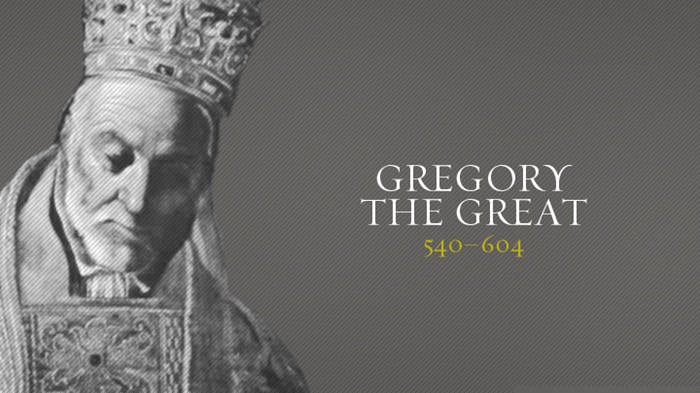 Catholic Church historians of the 20th century celebrate Pope Gregory as ‘one of the most important pastors among the popes’ (Baus), as ‘one of the most remarkable and cleanest figures on the chair of Peter’ (Seppelt/Schwaiger) and have long seen him occupying a ‘place among the great ones in the kingdom of heaven’ (Stratmann). Harnack, on the other hand, undoubtedly wiser than all the above and certainly more honest, rightly calls Gregory pater superstitionum, the father of (medieval) superstition.
Catholic Church historians of the 20th century celebrate Pope Gregory as ‘one of the most important pastors among the popes’ (Baus), as ‘one of the most remarkable and cleanest figures on the chair of Peter’ (Seppelt/Schwaiger) and have long seen him occupying a ‘place among the great ones in the kingdom of heaven’ (Stratmann). Harnack, on the other hand, undoubtedly wiser than all the above and certainly more honest, rightly calls Gregory pater superstitionum, the father of (medieval) superstition. 